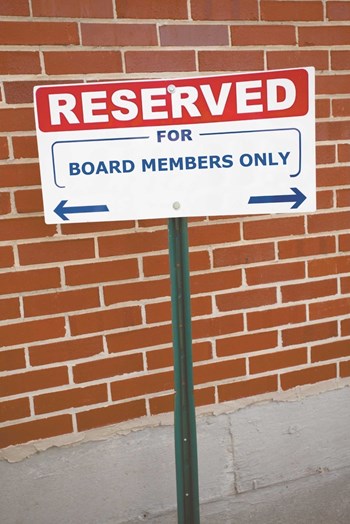
There’s nothing worse than dealing with someone who has let their power go to their head, and when you’re talking about a co-op or condo board member who starts to act above everyone in the community, huge problems can arise.
Serving on the board does not give trustees the right to operate under a different set of rules than those the rest of the community has to follow. There should be no preferential treatment for parking spots, flouting pet rules, or fast-tracking of their own improvement projects.
A board member, after all, has a fiduciary duty to manage the property and financial well-being of the cooperative or condo for the benefit of the shareholders or unit owners.
A fiduciary relationship exists when one party puts its trust in another party and grants to that second party a degree of influence and power. There is the understanding in a fiduciary relationship that the second party has a high level of accountability, including moral accountability, to the first party, and that the second party—the fiduciary—will put the best interests of the first party above their own.
“It’s really something board members need to address and be familiar with,” says Attorney Michael Merrill of the law firm of Merrill & McGeary in Boston. “Board members have to understand the general principle that the condo docs, the rules and regulations apply to them just as they do to everybody else.”
Board members have a duty to their buildings and to the people who elected them, and their fellow unit owners have a right to expect that their board members will act in good faith for the benefit of the community. “When a board member uses his/her board position for personal gain, or to purposefully bring gain or harm to another party in particular, that is a breach of fiduciary duty,” adds Michael Berenson, president of AKAM Associates, Inc., a management firm that has offices in New York and Florida.
Breaking All the Rules
In any communal environment that is governed by shared rules, there is the expectation that everyone will abide by the rules for the greater good. When a member of the community breaks the rules, they must accept the consequences established by the community.
“In one instance, we had in an association, a board member, who felt that the rule about pets didn’t apply to him,” notes Tim Arel of North Point Management in Andover, Massachusetts. The board member ran afoul of the rules regarding the size and number of pets allowed in the community—to the displeasure of fellow residents. “He was voted off the board, but more than that, it became an uncomfortable situation. Eventually, he sold his unit and moved.”
Attorney Merrill, who has worked with community associations for two decades, says that it’s essential that all rules be consistently applied to all people or it will be a recipe for disaster. “The rules can’t be applied arbitrarily and capriciously,” Merrill stresses. The goal of board members should be fairness and equal treatment of all owners—board members included.
“The pet thing tends to be one of the rules that create the most issues in associations because people view their pets as family members,” Arel says. Some of the other common rules that a board member might bend to benefit him or herself concern noise, carpeting, parking, storage rooms and other areas where people try to use their position to make things easier and less time-consuming for themselves.
They also tend to be visible problems that are hard for residents—including fellow board members—to ignore.
That’s often where the professional manager comes into play, Merrill says. “The first person that probably should get involved (in a rules violation) is the manager. He has to sort of raise the red flag to the board member that this is a problem,” he says. An example is the board member who is affected by a noise problem—perhaps with children running overhead on a hardwood floor—and insists that board action be taken, or fines imposed, against the offending neighbor.
Assuming that the board member is simply unaware that’s he or she is overstepping the bounds, Merrill says, the manager can say, “This isn’t how we’ve approached this situation before.” The more common approach would be to try to get the two neighbors to solve the problem themselves. “If the complaining person were not a trustee, the board wouldn’t get involved,” Merrill says, and that policy should hold for the board member as well.
When the rules-bending encroaches into the association’s finances, it’s essential for the brakes to be applied. “For example, you might have a damage situation, like water seepage into a unit, and the unit is owned by a trustee,” he says. The owner doesn’t have insurance to cover the damage, “and the trustee might say he should be compensated from trust funds” … but the trust doesn’t have liability.
“We have to say, ‘Look, we are not going to pay money to unit owners, and you’re a trustee, and we have to be very cautious about payments made to trustees if in a similar situation, you wouldn’t pay damages to another unit owner.’ ”
Peer Pressure at Work
Scott Barbera, director of management at Harvard Management Solutions in Merrimack, New Hampshire, says that in his experience, boards are good at policing themselves. “I think most board members understand that they need to follow the rules, just like everyone else. Occasionally a board president might have to have a little talk with another member of the board about not putting themselves above other owners.
“If you have a board member, who is being a little difficult, not answering emails—the board president might want to have a little conversation with that member,” he suggests. “I typically like to see boards handle it themselves. We work with a lot of good boards, and I haven’t run into a real problem with the issue. Most board members take a very professional approach to their duty.”
Fortunately, Arel says, there’s rarely more than a single rogue member on a board—and it’s likely that the remainder of the board won’t put up with misuse of authority. “If anything, many boards tend to be hyper-sensitive to this issue, and they go out of their way to be sure they’re leading by example. They often put more stringent reins on themselves than on their neighbors.”
From his experience, Arel says that when one person tries to bend the rules, other board members “usually speak up and bring that person into line.”
That kind of self-policing, he notes, is essential. “The board wouldn’t be able to run the association if they’ve allowed a violation to continue.” Of course, he adds, “any time you enforce a rule it’s not a comfortable situation—whether you’re dealing with another board member or anyone else in the community.”
Again, he says, that’s where the professional manager comes into play. “It’s the management company’s role to do the enforcement and take the heat,” he says, “so that the board members can still live with their neighbors.”
Merrill agrees. “Boards need to be educated by the property manager—and the association lawyer,” he says. “There are also good sources of information, like CAI (Community Associations Institute) seminars that the manager can suggest they attend.”
An association’s documents define the powers of the board as well as the rights and obligations of all owners, Berenson says. Board members should read the documents in order to understand the rules and regulations they have been entrusted to uphold. Board members, and owners as well, also should always be able to rely on their management company and corporate counsel to guide them properly.
A refresher course in the rules governing the association, and the responsibilities of the board, “should be a highlight for at least one working session” during the year, Arel says. “It’s just a reminder: Here is your responsibility.” That session should be offered even when there aren’t any new faces on the board, he adds. “Everyone can use a refresher course.”
Unfortunately, many owners—board members included—don’t know, or understand, the condominium rules.
Personality Traits
Following rules isn’t always easy, but they come with the condominium package. “When you buy into an association, before you buy you should educate yourself to understand what the rules are. It’s hard for a board to say, ‘you have to get rid of your pet.’ But if pets aren’t allowed in a community, maybe you shouldn’t buy a home in that community,” Arel says.
Before purchasing a unit, buyers should be sure that the association fits in with their lifestyle. “Maybe your family has three vehicles, and the association only allows two; or you have several pets, but there’s a limit of one, or a size limit on that pet. The time to consider that is before the purchase,” he says.
“We had a situation in a 55-plus community where a couple who bought a home really liked to go out and garden. They wanted to plant shrubs and bulbs, but it’s not allowed,” Arel says. “It wasn’t easy for the board to say they couldn’t do that. But in an association, you might have to give up some of the things you enjoy—even if you’re elected to the board.”
When a board member tries to stretch the rules, Merrill says, “My view is just to say, ‘you can’t do it, you shouldn’t do it,’ and then try to get the other trustees to recognize that, and for the property manager to put the brakes on it.” The manager, he adds, may not have a legal responsibility to take action, “but in terms of industry standards, may have an obligation to at least bring some sunshine to the issue.”
Unit owners who feel that board members are taking advantage of their position also have the right to speak out. “You can call the property manager or trustees and try to have a conversation,” Merrill says. “Follow up with a short, clear, concise letter—don’t write five pages, or call people names; just put out bullet points saying here’s the problem, here’s what I’d like you to do. And follow it up in a reasonable amount of time. And be persistent. If you do it in a professional way, in a calm way, and are persistent, you’ll probably see a change in the conduct you’re concerned about.”
Ultimately, when a board member simply tries to put himself or herself above the community’s rules, ignores those ‘red flags’ raised by property managers and the gentle reminders by the association attorney, there community has a solution at its fingertips—at the ballot box. “Show your neighbors why these persons should be removed or not re-elected, and get people to go out and participate in the election. Go door to door and collect proxies,” Merrill says. Many people who see problems don’t have the energy to go out and campaign, or find someone to run and get elected, but the surest way to change the behavior of a board is through the ballot box.
Rogue board members are awful for building morale, have a corrosive effect on residents’ confidence in their board, and can cause a myriad of problems. If you’re a board member, remember to stay fair and keep everything on an equal playing field.
Keith Loria is a freelance writer and a frequent contributor to New England Condominium. Associate Editor Pat Gale also contributed to this article.






2 Comments
Leave a Comment